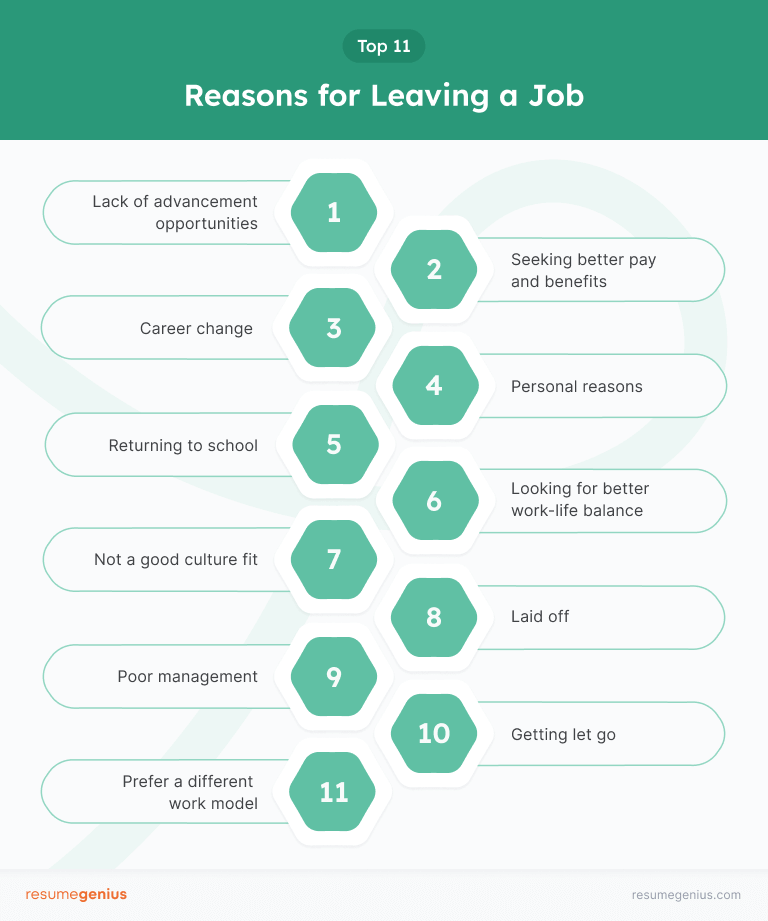Despite an uncertain economy, the Great Resignation is still going on in 2023. What exactly is pushing workers to leave their jobs? Read our top 11 reasons people leave a job to see how many — if any — apply to you:

11 Reasons for Leaving a Job
While quiet quitting is still trending in 2023, you may be thinking of actually quitting your job. We outline 11 reasons for leaving a job to help you explore your options:
1. Lack of career advancement opportunities
During the start of the Great Resignation, Pew found that 63% of people who quit their jobs in 2021 did so due to a lack of advancement opportunities. Whether you’re looking for a promotion — as well as the pay and benefits that go with it — or just more opportunities to learn new skills or take on new projects, you may want to find a new job that challenges you to achieve more.
2. For better pay and benefits
In many US cities, the minimum wage is not even close to the living wage, or the wage needed for housing, childcare, transportation, food, and more. Unsurprisingly, 63% of Pew respondents who had quit their job in 2021 said “low pay” was a factor in leaving. With inflation cooling down but still high, people experience better wage gains by changing their job rather than staying in the same job.
3. It’s time for a career change
Workers are currently changing careers in high numbers, especially Millennials — who make up just 35% of the workforce but represent 55% of career changers since March 2020. For many, the pandemic either directly forced them to consider a career change — or merely highlighted how unsatisfied they were with their previous line of work.
4. To go back to school
Whether you need to go back to school to advance yourself in your current career or to gear up for a career change, going back to school is a good reason to leave a job. While it’s possible to work full-time and go to school, doing so can create heavy demands on your time and energy.
5. It’s not a good culture fit
Most employees report that it takes less than 1 month to determine if they’re a good fit with a new company, whether it be with coworkers, leadership, or the organization as a whole. Maybe you don’t get along with coworkers or maybe the company doesn’t value workplace diversity. Given that so much of our time is spent at work, it may not be worth it to stay in an unsuitable working environment, even if the work interests you or the pay is good.
6. Poor management
In a 2019 survey, 43% of workers admitted to quitting a job because of a manager and 14% have even left multiple companies because of conflicts with a boss. If trying to adapt to your boss’ managerial style doesn’t improve your working situation, it may be time to leave.
7. For different work models
After the pandemic demonstrated that remote work was possible, many workers didn’t want to give up this work arrangement. Unsurprisingly, remote work job postings have nearly tripled between 2022 and 2019. Other work models, such as flexible working hours and four-day work weeks, are also desirable alternatives.
8. Seeking better work-life balance
After the pandemic, work-life balance increased in importance to many workers, with more workers naming work-life balance over salary as the primary factor that attracted them to their current role (41% vs. 36%).
9. Personal reasons
Personal reasons that might prompt workers to leave a job include:
- health reasons
- childcare responsibilities
- needing to take care of a sick or elderly family member
- needing to relocate
While you can talk with your manager about alternative arrangements to help you work while you take care of personal matters, it’s sometimes unavoidable to leave a job for personal reasons. When it comes to telling your boss (or future employers) about your leaving, remember that leaving a job for personal reasons isn’t something to feel awkward or ashamed about.
10. Layoffs
Tech layoffs have been rampant since the end of the 2022. While layoffs in other industries are low, company acquisitions, mergers, and general economic downturns can mean you’re suddenly out of a job through no fault of your own.
11. Getting let go
As most American workers are at-will employees, they can be fired at any time without warning. While at-will employers don’t have to explain why they’re letting you go, try your best to ask about the reasons for your termination. Not only can doing so help you appeal the termination, but can provide you useful information to improve your performance in future roles, evaluate your next steps, and help you reply when asked “Why did you leave your last job?” in an interview.
3 tips for leaving your job
If you identify with any of these reasons for leaving a job and decide it’s time to quit, you’ll need to make preparations for a smooth exit. Here are 3 tips for a smooth transition:
1. Plan your next steps
Understanding the reasons motivating you to leave your job will help you determine your logical next step.
- Need to leave to take care of a sick family member? Focus on taking time off or looking for part-time work.
- Want to switch careers from a retail worker to a nurse? Go back to school to obtain your nursing credential.
- Sick of your job where you’re overworked and underpaid? Start your job search, making sure to prioritize pay and good work-life balance when looking for new opportunities.
Whatever your next step is, make sure you’re financially prepared. How sizable your savings are can determine the timing of your departure.
In some cases, such as leaving your job to take on childcare duties at home, your household will lose a paycheck and should prepare to use savings, reduce expenses, and explore work from home jobs that will fit your schedule.
In other circumstances, like switching jobs for a better working environment, you may try to postpone leaving until you’ve secured a new position to avoid relying too much on your savings.
2. Compile your achievements
All the work you’ve done at your current job represents a considerable amount of your time and effort. Save the work you’ve built up to help launch you into your next stage.
Making sure not to take any company property or proprietary information, save and send samples of your work to yourself to remind yourself what you’ve completed.
If you haven’t been keeping a work diary throughout your time at the job, take stock of your achievements to add to your resume while you have access to all the projects you’ve done.
But be sure to do this before formally resigning with your boss in case your employer asks you to leave immediately. In other cases, going through your work before you leave can help you and your employer understand:
- what work still needs to be done
- how to allocate your workload to others
- who you might need to train before you leave
3. Tell your manager you’re leaving
Once you’ve made preparations to leave, the next step is to resign. Here’s how to do so gracefully:
Give notice to your manager in-person or in a resignation letter
Whether you have an in-person discussion with your manager, send a letter of resignation, or both, you’ll need to specify the reasons you’re leaving. Avoid discussing negative reasons that are pushing you to leave and focus on the positive reasons drawing you to your next step.
Be level-headed in your exit interview
Not all companies hold exit interviews, and those that do differ widely in how they conduct them. Whether the HR department collects your feedback in a survey or an in-person interview, the goal of the exit interview is for the company to learn how to improve.
Because the confidentiality of your statements isn’t always guaranteed and you may want to ask your employer for a recommendation, avoid calling out anybody specifically or ranting unprofessionally.
When giving constructive feedback, point out policies or systems that could be changed rather than blaming team members. For example, if the real reason you’re leaving is because your boss gives you unreasonable workloads, suggest instead that two employees be allocated to do your role’s work.
Frequently asked questions
Want to know more about leaving a job? Find our answers to common questions related to leaving a job below.
1. How do I explain leaving a job for health reasons?
You explain leaving a job for health reasons when resigning by stating your intention to leave (including when your last day will be) and thanking your employer for the opportunities and support you’ve received. There’s no need to provide more specifics other than “health issues” unless you feel comfortable doing so.
See a sample answer for explaining leaving a job for health reasons when resigning:
I’ve decided to step away from work to take care of some health issues. I’ve learned so much and enjoyed working with the whole team while here, but in order to focus on my health, I’d like to submit my two weeks’ notice.
Explain leaving a job for health reasons when interviewing for a new position by only giving as much detail as you’re comfortable with. While you don’t have to dwell on the health issue, you should follow up the answer by assuring hiring managers that the health problem has since been resolved or that it won’t affect your ability to do work.
Here’s an example of how to explain leaving a job for health reasons in an interview:
I left my previous position due to health reasons. My health issues have since cleared up, and I’m positive it won’t affect my attendance or my ability to perform my work.
2. What is the best reason for leaving a job?
The best reason for leaving a job depends on the specific individual and workplace, often with multiple factors affecting an employee’s decision to change jobs.
When interviewing at new places or participating in exit interviews, you should always mention professional reasons rather than personal reasons or higher pay.
A professional reason, such as wanting more growth opportunities, gives future employers more information about you as a worker and allows you to stress why you want to work for the company you’re interviewing with.
3. What do I put for reasons I left my last job on a job application?
When asked the reasons for leaving your last job on a job application, you should put only professional and positive reasons, such as a desire for greater career growth.
Additionally, unless there is a dedicated section, don’t use too much space on your job application for answering this question (1 sentence is sufficient). Use your cover letter and resume to sell your qualifications and leave answering why you left your last job for the interview.
Click to rate this article
4.6 Average rating
















